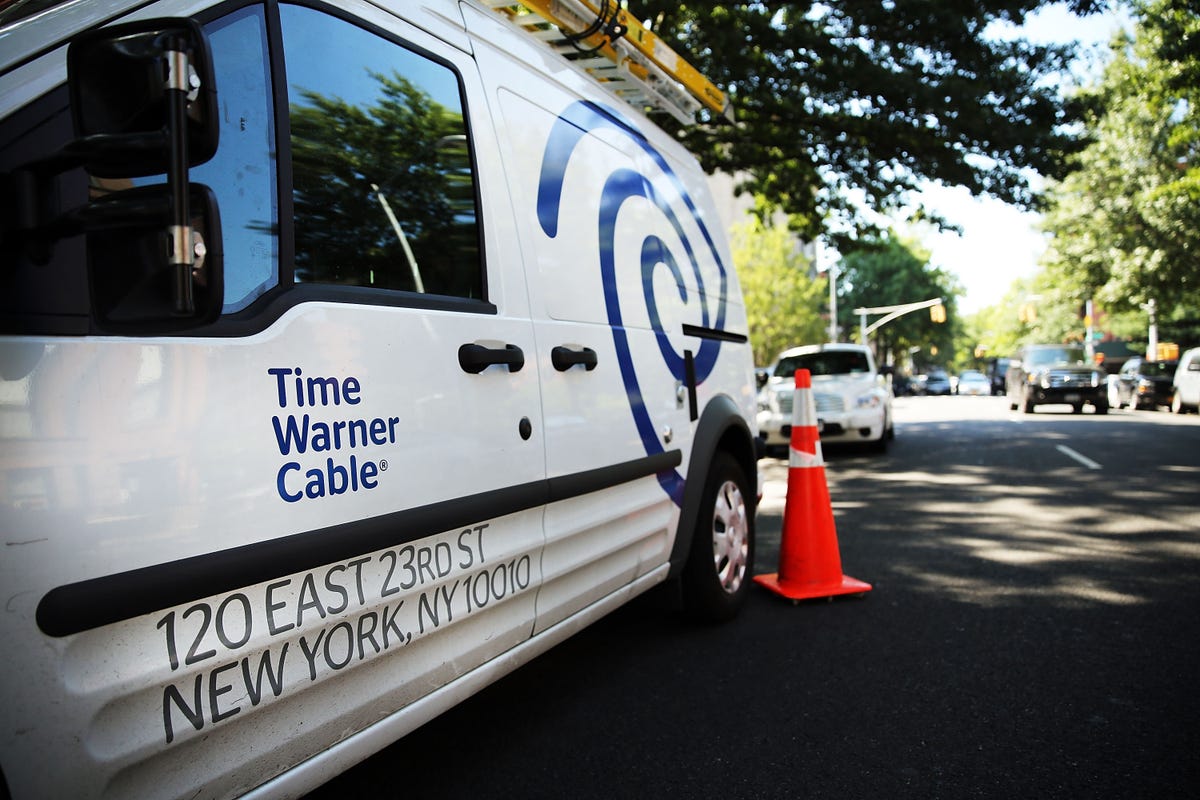
Spencer Platt/Getty Images
Charter and Time Warner Cable want US regulators to know one simple thing: This time it’s different.
Just a month after government concerns scuttled Comcast’s $45.2 billion bid for TWC, Charter Communications on Tuesday came up with a new mega-merger deal with Time Warner Cable, valuing TWC at over $55 billion. The new agreement includes Charter gobbling up smaller, privately owned cable provider Bright House Networks for $10.4 billion.
However, while the dollar figure is bigger this time around, Charter and TWC executives cautioned that the merged company would have millions fewer customers and far less revenue than in the Comcast-TWC deal.
“This is a very different transaction,” Time Warner Cable CEO Robert Marcus said on a call with analysts Tuesday morning. “We’re talking about a resulting entity that’s significantly smaller…We’re confident it’s going to get done.”
If Comcast and TWC had been able to combine, bringing together the US’ largest and second-largest cable providers, respectively, the merged company would have served about 35 million Internet customers. Comparatively, a merged Charter would serve 19 million Internet customers.
Regulators were particularly concerned about Comcast taking control of so many Internet connections, resulting in Comcast holding about 57 percent of the broadband Internet market. That much power in the hands of one company, critics argued, could have driven costs for consumers higher, influenced the distribution of video content and hindered competition from Internet companies like Netflix that stream video over broadband networks. The new Charter would control less than 30 percent of broadband Internet customers.
NBCUniversal, owned by Comcast, was another potential sticking point to the Comcast deal that won’t be a concern this time. Regulators were likely worried Comcast’s bigger size — with about 30 million video customers after the merger — may have allowed it to raise prices for NBC’s shows to competing cable providers. Since TWC and Charter don’t own media properties, those same issues won’t come up in the new deal.
“We’re a very different company than Comcast and this is a very different transaction,” Charter CEO Thomas Rutledge said on Tuesday’s call.
The latest video-distributor mega-merger deal illustrates the changing environment for cable and satellite providers, as they try to expand their businesses and gain a stronger footing against competitors like Netflix and Hulu, which are causing more people to drop or slim down their cable packages. In addition to the Charter deal, US regulators are still weighing AT&T’s $48.5 billion deal for satellite-TV provider DirecTV, announced last year.
Following the merger, TWC shareholders will own about 44 percent of the new Charter, nearly double the stake they would’ve gotten in the Comcast deal, with Charter and its major investor Liberty owning 43 percent. Advance/Newhouse, Bright House’s parent, will own 13 percent. The deal is expected to close by the end of the year.
Before Comcast and Time Warner Cable announced their deal last year, Charter had aggressively pursued TWC and was expected to come forward with a new merger deal.
TWC shares jumped 7 percent midday, but still below the merger price, with investors appearing cautious after the Comcast deal fell apart. Charter’s shares were up 2 percent. Comcast’s stock was up slightly.
In a short statement, Tom Wheeler, chairman of the Federal Communications Commission, said Tuesday his agency will review the merits of the Charter proposal, determine if it’s in the public interest and “look to see how American consumers would benefit if the deal were to be approved.”
Comcast CEO Brian Roberts offered an even shorter statement: “This deal makes all the sense in the world. I would like to congratulate all the parties.”
Even after the merger, the new Charter will remain smaller than Comcast is today, with 24 million total customers versus Comcast’s 27 million. On revenue, Comcast brought in $17.9 billion in the latest quarter, compared with TWC’s $5.8 billion and Charter’s $2.4 billion. Charter and TWC could argue that their deal would allow them to become at least as large as Comcast and perhaps let them trim costs for customers by cutting down on redundancies within the three separate companies, said Jan Dawson, an analyst at Jackdaw Research.
In comparison, Comcast was already the biggest operator in its industry and the TWC deal would have just made it even bigger. Also, both TWC and Comcast have less than stellar customer service reputations.
Considering that, Dawson said: “There really wasn’t that much to recommend that deal from a consumer perspective.”




